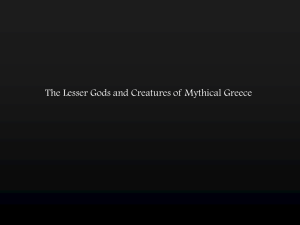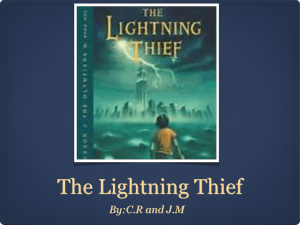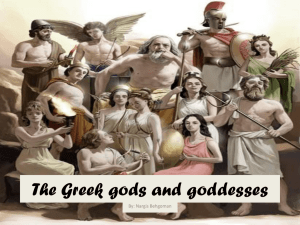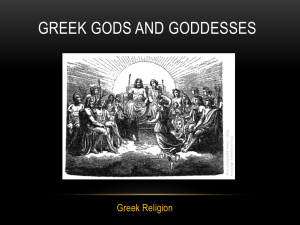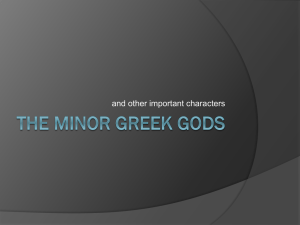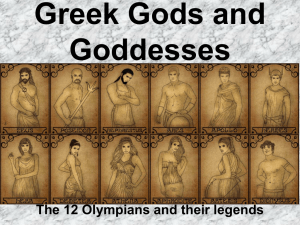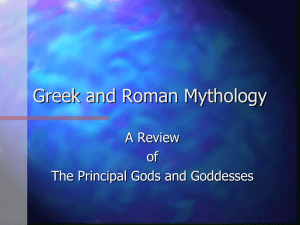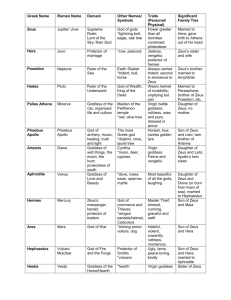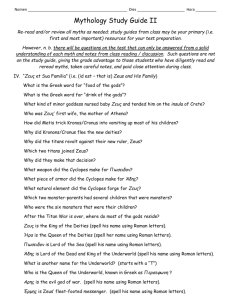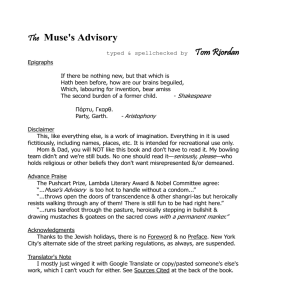Roman-and-Greek
advertisement
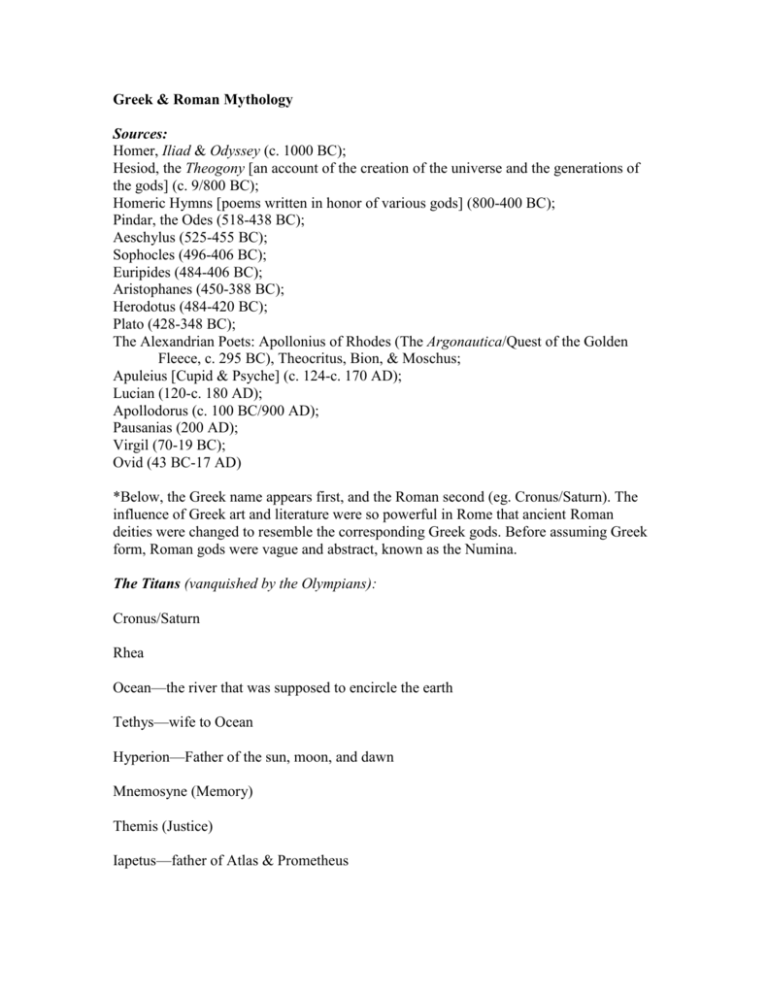
Greek & Roman Mythology Sources: Homer, Iliad & Odyssey (c. 1000 BC); Hesiod, the Theogony [an account of the creation of the universe and the generations of the gods] (c. 9/800 BC); Homeric Hymns [poems written in honor of various gods] (800-400 BC); Pindar, the Odes (518-438 BC); Aeschylus (525-455 BC); Sophocles (496-406 BC); Euripides (484-406 BC); Aristophanes (450-388 BC); Herodotus (484-420 BC); Plato (428-348 BC); The Alexandrian Poets: Apollonius of Rhodes (The Argonautica/Quest of the Golden Fleece, c. 295 BC), Theocritus, Bion, & Moschus; Apuleius [Cupid & Psyche] (c. 124-c. 170 AD); Lucian (120-c. 180 AD); Apollodorus (c. 100 BC/900 AD); Pausanias (200 AD); Virgil (70-19 BC); Ovid (43 BC-17 AD) *Below, the Greek name appears first, and the Roman second (eg. Cronus/Saturn). The influence of Greek art and literature were so powerful in Rome that ancient Roman deities were changed to resemble the corresponding Greek gods. Before assuming Greek form, Roman gods were vague and abstract, known as the Numina. The Titans (vanquished by the Olympians): Cronus/Saturn Rhea Ocean—the river that was supposed to encircle the earth Tethys—wife to Ocean Hyperion—Father of the sun, moon, and dawn Mnemosyne (Memory) Themis (Justice) Iapetus—father of Atlas & Prometheus Atlas—bore the world on his shoulders Prometheus—the savior of mankind The Olympians: Zeus/Jupiter—the supreme ruler; lord of the sky, the rain-god, the cloud-gatherer, who wielded the thunderbolt; his breastplate was the aegis, awful to behold; his bird was the eagle; his tree the oak; his oracle was Dodona in the land of oak trees (the god’s will was revealed by the rustling of oak leaves which the priests interpreted) Poseidon/Neptune—Zeus’ brother; second only to Zeus in eminence; ruler of the sea; gave the first horse to man; called “Earth-shaker”; always shown carrying his trident Amphitrite—Poseidon’s wife; granddaughter of the Titan, Ocean Hades/Pluto—Zeus’ brother; god of the underworld; the god of wealth, of the precious metals hidden in the earth; king of the dead; had a helmet which made whoever wore it invincible. Persephone/Proserpine—Hades’ wife Hestia/Vesta—Zeus’ sister; goddess of the hearth; symbol of the home. Hera/Juno—Zeus’ wife and sister; brought up by the Titans Ocean and Tethys; the protector of marriage; the cow and peacock were sacred to her; Argos was her favorite city Ares/Mars—the son of Zeus and Hera; god of war; the vulture was his bird, and the dog his animal. Pallas Athena/Minerva—Zeus’ daughter; sprang from Zeus’ head full-grown and in full armor; the goddess of the city, the protector of civilized life, of handicrafts and agriculture; the inventor of the bridle, who first tamed horses for men’s use; Athens was her special city; the Parthenon was her temple; the olive created by her was her tree; the owl her bird. Phoebus Apollo—the son of Zeus and Leto/Latona; born on the island of Delos; the master musician; the archer-god; the healer who first taught men the healing arts; god of light; god of truth; his oracle was in Delphi; his tree was the laurel. Aphrodite/Venus—Daughter of Zeus and Dione (although also said to have risen from sea foam); the goddess of love and beauty; called Cytherea or Cyprian after her birthplace(s); wife of Hephaestus; the myrtle was her tree; the dove her bird. Hermes/Mercury—son of Zeus and Maia (daughter of Atlas); wore winged sandals, a winged helmet, and carried a staff (the Caduceus); swift in motion; Zeus’ messenger; the shrewdest and most cunning of the gods; the Master Thief; the god of commerce and the market; the guide of the dead. Artemis/Diana—daughter of Zeus and Leto; born on Mount Cynthus in Delos; Apollo’s twin sister; the Lady of Wild Things; Huntsman-in-chief; the protectress of youth; she was the moon (called Phoebe and Selene/Luna); she has three forms: Selene in the sky, Artemis on earth, Hecate in the lower world and in the world above when in darkness; her sacred tree was the cypress; all wild animals, but especially the deer, were sacred to her. Hephaestus/Vulcan—either the son of both Zeus and Hera, or Hera’s son alone; the god of fire; ugly and lame; the metal smith of the gods; married either to one of the three Graces, or Aphrodite; patron of handicrafts, the arts, and agriculture; patron of smiths. Lesser Gods: Eros/Cupid—Aphrodites’ son; god of love; often represented blindfolded, because love is often blind; attended by Anteros (avenger of lighted love), Himeros (longing), and Hymen (god of the wedding feast). Demeter/Ceres—daughter of Cronus and Rhea; goddess of the corn Dionysus/Bacchus—god of the vine Hebe—daughter of Zeus and Hera; goddess of youth Iris—goddess of the rainbow; messenger of the gods The Graces (3): (Aglaia (Splendor), Euphrosyne (Mirth), and Thalia (Good Cheer)— daughters of Zeus and Eurynome (daughter of the Titan, Ocean); a triple incarnation of grace and beauty. The Muses/Camenae (9): Clio (muse of history), Urania (muse of astronomy), Melpomene (muse of tragedy), Thalia (muse of comedy), Terpsichore (muse of the dance), Calliope (muse of epic poetry), Erato (muse of love poetry), Polyhymnia (muse of songs), Euterpe (muse of lyric poetry)—daughters of Zeus and Mnemosyne (memory); inspired men. Themis—the Right, or Divine Justice Dike—Human Justice Nemesis—Righteous Anger Aidos—Reverence and Compunction Pontus—the Deep Sea; the son of Mother Earth and Nereus Nereus—the Old Man of the Sea; married to Doris (daughter of Ocean); father of the fifty Nereids (sea nymphs) Triton—son of Poseidon and Amphitrite; the trumpeter of the sea Proteus—Poseidon’s son or attendant; had the power to foretell the future and of changing shape at will. The Naiads—water nymphs that dwelled in brooks, springs, and fountains. Pan—Hermes’ son; part man, part goat (with goat horns and hooves); god of the goatherd and shepherd; great musician (playing on his reed pipe) Silenus—Pan’s son or brother; jovial, usually drunken, fat old man who rode an ass; both teacher and devoted follower of Dionysus The Sileni—part man, part horse (walking on two legs, with horses hooves, ears and, tails The Satyrs/Fauns—goat-men living in the wild places of the earth Oreads—nymphs of the mountains Dryads—nymphs of trees Aeolus—King of the winds: Boreas/Aquilo (north wind), Zephyr/Favonius (west wind), Notus/Auster (south wind), & Eurus (east wind) Charon—ferries the souls of the dead across the waters to Tartarus Cerberus—the three-headed dragon-tailed dog that guards the gates to the underworld The Erinyes/Furies (3)—Tisiphone, Megaera, and Alecto; punished the wicked in the underworld The Rivers of the Underworld: Acheron (the river of woe), Cocytus (the river of lamentation), Phlegethon (the river of fire), Styx (the river of the unbreakable oath by which the gods swear), and Lethe (the river of forgetfulness) Judges of the Underworld: Rhadamanthus, Minos, & Aeacus; pass sentence on the dead, sending the wicked to everlasting torment, and the good to the Elysian Fields Centaurs—half man, half horse Gorgons (3)—Dragon-like creatures with wings whose looks turned men to stone The Graiae (3)—sisters to the gorgons; grey women who shared one eye between them The Sirens—lived on an island in the sea; lured men to the deaths with their enchanting voices The Fates (Moirae/Parcae): Clotho (the spinner, who spun the thread of life), Lachesis (the disposer of lots, who assigned each man his destiny); Atropos (she who could not be turned, cut the thread at death) Lares—Roman; spirit of an ancestor Penates—Roman; gods of the hearth and guardians of the storehouse Janus—Roman; two-faced god; the god of good beginnings

